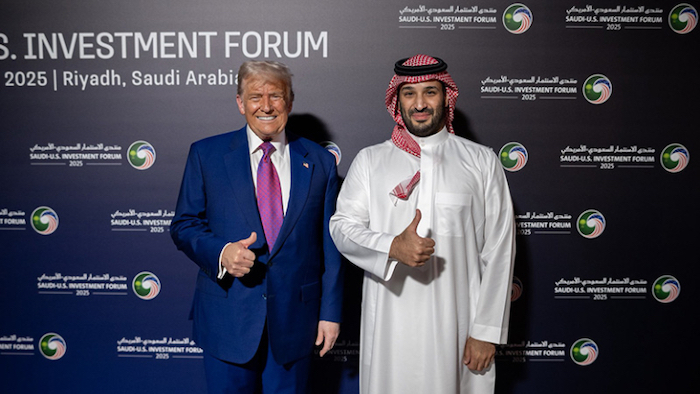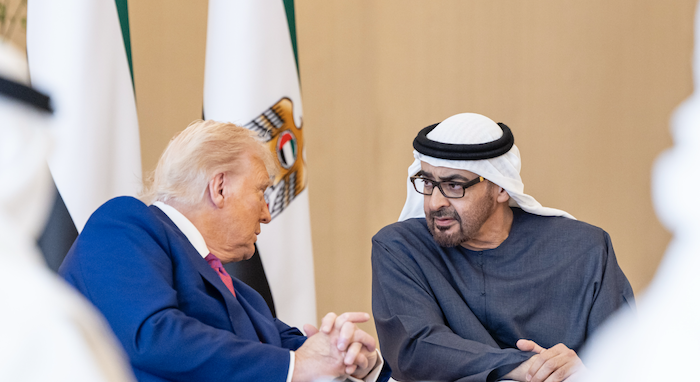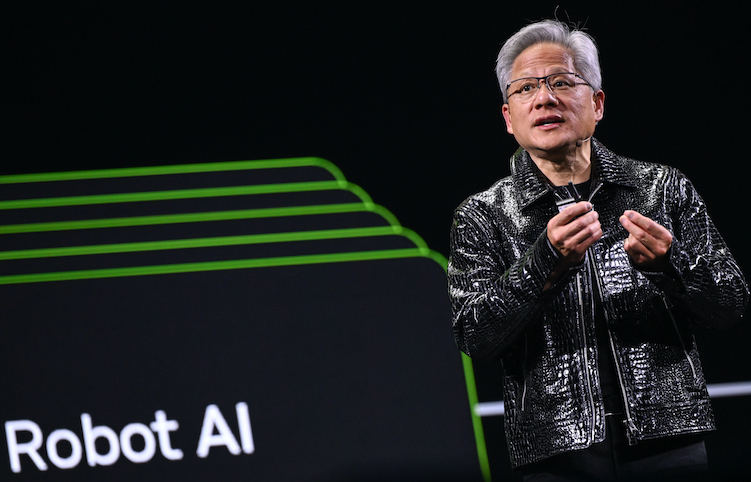It’s been a big week for news on chips and chipmakers. US President Trump has sought to chart a different course to his predecessor Joe Biden in trying to allow US chipmakers to earn healthy profits, while also denying China access to the most powerful AI chips made by top American companies.
A lot could hinge on decisions that the new president has made selling a huge number of Nvidia chips to companies in the Middle East, despite serious concerns in his – and Biden’s – government about Saudi Arabia and the United Arab Emirates’ close ties with Beijing.
On Friday Trump said the United Arab Emirates and the United States have agreed to create a path for the Gulf country to buy some of the most advanced artificial intelligence semiconductors from US companies.
ALSO SEE: Mass Layoffs Avoided in China, But Export Sector Badly Shaken
The agreement – to help the Gulf nation build the largest artificial intelligence campus outside the United States – was finalised on Thursday during Trump’s visit to Abu Dhabi.
It is the type of deal that previously faced restrictions over Washington’s concerns that China could access the technology, and as such, is a major win for the UAE, which has been trying to balance its relations with its longtime ally the US and its largest trading partner, China.
It reflects the Trump administration’s confidence that the chips can be managed securely, in part by requiring data centres be managed by US companies.
UAE, Saudi firms to fund data centres in US

The AI agreement “includes the UAE committing to invest in, build, or finance US data centres that are at least as large and as powerful as those in the UAE,” the White House said.
“The agreement also contains historic commitments by the UAE to further align their national security regulations with the United States, including strong protections to prevent the diversion of US-origin technology.”
The UAE could be allowed to import 500,000 of Nvidia’s most advanced AI chips a year starting in 2025, Reuters reported on Thursday, citing sources.
Central to the agreement announced on Thursday is the 10 square mile (25.9 square kilometre) AI campus in Abu Dhabi with 5 gigawatts of power capacity for AI data centres, the US Commerce Department said.
Trump, speaking on Friday at the last stop of his Middle East tour, which has also included stops in Saudi Arabia and Qatar, said: “We’re making great progress for the $1.4 (trillion) that UAE has announced it intends to spend in the United States.
“Yesterday the two countries also agreed to create a path for UAE to buy some of the world’s most advanced AI semiconductors from American companies, a very big contract,” he said.
“This will generate billions and billions of dollars in business and accelerate the UAE’s plans to become a really major player in artificial intelligence,” Trump added.
The UAE in March committed to a 10-year, $1.4 trillion investment framework in the United States in sectors including energy, AI and manufacturing.
The countries did not say which AI chips from Nvidia or other companies could be included in UAE data centres, but Nvidia chief executive Jensen Huang was seen in televised footage conversing with US President Donald Trump and UAE President Sheikh Mohamed bin Zayed Al Nahyan at a palace in Abu Dhabi on Thursday.

Nvidia and two other chipmakers – AMD and Qualcomm – were also involved in deals announced on Tuesday in Saudi Arabia, where Trump said he secured $600 billion in commitments for US firms.
Nvidia will sell hundreds of thousands of AI chips in Saudi, with a first tranche of 18,000 of its newest Blackwell chips going to Humain, an AI startup just launched by Saudi Arabia’s sovereign wealth fund.
Chip designer Advanced Micro Devices and Qualcomm also announced large deals with Humain, while the White House said Saudi firm DataVolt would invest $20 billion in AI data centres and energy infrastructure in the United States.
US warning on Huawei’s Ascend chips
Meanwhile, there was a flurry of activity and announcements in the lead-up to this announcement.
On Tuesday the US Bureau of Industry and Security said it was taking a more stringent approach to foreign artificial intelligence chips – and that “using Huawei’s Ascent chips anywhere in the world violates US export controls.”
It issued a guidance note that said Huawei chips were seen to have violated a measure that requires hard-to-get licences to export US technology to the Chinese tech conglomerate. Thus, companies around the world using AI chips made by Huawei could face criminal penalties for violating US export controls.
Huawei’s three Ascend chips – 910B, 910C and 910D – were likely to have been “designed with certain US software or technology or produced with semiconductor manufacturing equipment that is the direct produce of certain US-origin software or technology, or both.”
The Chinese tech giant has reportedly begun delivering AI chip ‘clusters’ to clients in China that it claims outperform Nvidia’s comparable product, “on crucial metrics such as total compute and memory,” according to a report by the FT on Thursday.
“The system relies on a large number of 910C chips which individually fall short of Nvidia’s most advanced offering, but collectively deliver superior performance to a rival Nvidia cluster product,” it said, noting that there is growing concern in the US that the Huawei will soon be selling AI processors in China and foreign markets that can compete with Nvidia and other US companies’ products.
More Chinese chipmakers may be blacklisted
On Tuesday, the US Commerce Department also scrapped the Biden Administration’s AI Diffusion Rule, which was due to take effect on May 15 (yesterday). The Trump Administration has described the rule as too bureaucratic.
The Department is also reportedly considering placing more Chinese chipmakers, such as ChangXin Memory (CXMT), on its export blacklist, according to a report by Reuters on Friday, which cited a person familiar with the matter.
ChangXin has rapidly boosted its share of the global Dram memory-chip market and is reportedly seeking to become a bigger developer of high-bandwidth memory chips, which are needed for AI models.
The Bureau of Industry and Security is also looking at adding subsidiaries of Semiconductor Manufacturing International Corporation and Yangtze Memory Technologies Co to the “Entity List”, the person said.
The timing of the move has been complicated by a recent trade deal between the US and China, according to the Financial Times, which first reported the news.
Companies on the list cannot receive goods or technology exports without a license, which is generally denied. Companies are added for activities viewed as contrary to US national security or foreign policy interests.
The Biden administration added more than two dozen Chinese entities to the list in January, including Zhipu AI, a developer of large language models, and Sophgo, a company whose TSMC-made chip was illegally incorporated into a Huawei artificial intelligence processor.
The Commerce Department at that time also strengthened controls on the flow of chips to China to better prevent diversion to Huawei.
- Jim Pollard with Reuters
ALSO SEE:
Trump Tells Apple CEO ‘I Don’t Want You Building in India’
Rogue Communication Devices Found in Chinese Solar Inverters
China’s CATL Looking to Raise $4 Billion In Hong Kong Listing
Satellite Images Show Huawei’s Expanding Chip Facilities – FT
US Lawmakers Push Location-Tracking For High Powered AI Chips
Nvidia and China Tech Giants Hit by Latest US Chip Clampdown
Server Fraud Case in Singapore May be Linked to AI Chips, China
























